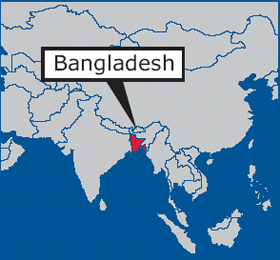Bangladesh quizzes Islamist leader on mutiny link
 Dhaka - Investigators on Monday interrogated a top leader of Bangladesh's Islamist party Jamaat-e-Islami over last month's troop mutiny at the headquarters of the county's border force, which killed 75 people, officials said.
Dhaka - Investigators on Monday interrogated a top leader of Bangladesh's Islamist party Jamaat-e-Islami over last month's troop mutiny at the headquarters of the county's border force, which killed 75 people, officials said.
Coming out of the headquarters of the Criminal Investigation Department after interrogation, Jamaat-e-Islami assistant secretary general Abdur Razzak said the department summoned him to taint his political image.
Department officials denied the allegation of harassment, saying the three and a half hours of questioning was necessary for the investigation.
"We have verified some information obtained from previous interrogations of soldiers," Abdul Kahhar Akond, investigation officer, told reporters. "We may call some other people for the sake of a proper investigation into the rebellion and killings."
Razzak was the first politician interrogated in connection with the mutiny at the Dhaka headquarters of the Bangladesh Rifles border force since the department began investigating the mutiny more than a month ago.
"I don't have any connection with the carnage," Razzak, a lawyer by profession, said, adding that he was in the High Court on February 25, the day the mutiny erupted.
It was reported that he had spoken to some members of the border guards on February 25 and the government imposed a ban on his travel abroad. He denied the allegation.
Razzak sought protection from the High Court, which asked authorities not to harass or arrest him or bar him from travelling abroad until April 5.
"They questioned me in accordance with the High Court directives," Razzak said, adding that investigators wanted to know about his education, family, overseas travel and whereabouts on February 25 and 26.
They also examined his passport but did not seize it, he added.
Bangladeshi investigators, assisted by agents from the US Federal Bureau of Investigation and Britain's Scotland Yard, arrested as many as 750 Bangladesh Rifles soldiers suspected to be involved in the troop rebellion against their commanders.
Earlier, a government minister coordinating the investigations by three separate agencies said he had suspected a militant-link in the mutiny. (dpa)